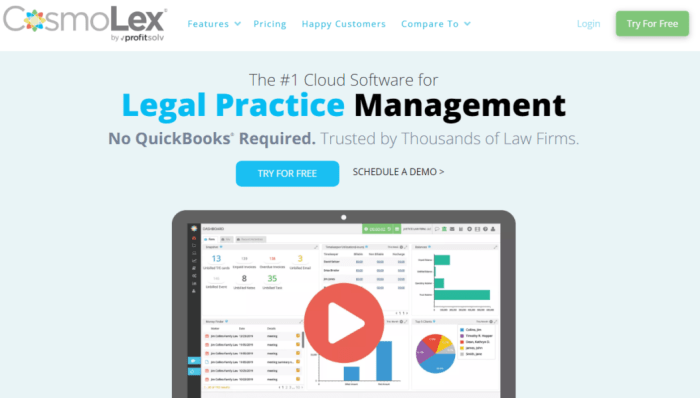Best legal CRM software is revolutionizing how legal professionals manage their practices. Efficient case management, improved client communication, and streamlined workflows are no longer distant dreams but achievable realities thanks to the power of specialized CRM solutions. This exploration delves into the key features and benefits that distinguish top-tier legal CRM software, helping you navigate the options and select the perfect tool to enhance your firm’s productivity and client satisfaction.
From contact management and document automation to billing and reporting, these systems offer a comprehensive suite of tools designed to address the unique needs of the legal industry. By centralizing client information, automating repetitive tasks, and providing insightful analytics, legal CRM software empowers lawyers to focus on what matters most: providing exceptional legal services.
Choosing the right Customer Relationship Management (CRM) software is crucial for law firms of all sizes. A robust legal CRM streamlines operations, improves client communication, and ultimately boosts profitability. This detailed guide explores the best legal CRM software options available, considering factors like features, pricing, ease of use, and integration capabilities. We’ll delve into the key features to look for, help you navigate the selection process, and answer frequently asked questions to empower you to make an informed decision.
Key Features of Top-Rated Legal CRM Software
The ideal legal CRM should go beyond basic contact management. It needs to cater to the unique needs of the legal profession. Here are some essential features to consider:

Source: infino.legal
Client Management, Best legal crm software
- Centralized Database: A single, easily accessible repository for all client information, including contact details, case history, documents, and communication logs.
- Matter Management: Efficiently track cases, deadlines, and tasks associated with each client matter. This often includes features like task assignment, progress tracking, and automated reminders.
- Document Management: Secure storage and retrieval of legal documents, ensuring compliance with data privacy regulations.
- Contact Management: Beyond basic contact details, advanced features include relationship mapping, identifying key stakeholders, and tracking communication history.
Communication & Collaboration
- Email Integration: Seamlessly integrate with your email client to manage communications directly within the CRM.
- Calendar & Scheduling: Schedule appointments, court hearings, and meetings directly within the system, avoiding scheduling conflicts.
- Internal Communication Tools: Facilitate collaboration among team members through features like internal messaging, task assignment, and shared calendars.
- Client Portal: Provide clients with secure access to their case files, documents, and communication history, enhancing transparency and communication.
Legal-Specific Features
- Time Tracking & Billing: Accurately track billable hours and generate invoices efficiently, improving profitability and financial management.
- Conflict of Interest Checking: Prevent conflicts of interest by automatically checking new clients against existing ones.
- Case Management Workflow Automation: Automate repetitive tasks, such as generating legal documents, sending reminders, and updating case statuses.
- Reporting & Analytics: Gain insights into firm performance, client behavior, and case outcomes through comprehensive reporting and analytics dashboards.
Integration Capabilities
- Email & Calendar Integrations: Seamless integration with popular email clients (like Outlook and Gmail) and calendar applications.
- Document Management Systems: Integration with document management systems for secure storage and retrieval of legal documents.
- Accounting Software: Integrate with accounting software for streamlined billing and financial management.
- E-signature Tools: Facilitate the electronic signing of legal documents for faster turnaround times.
Top Legal CRM Software Options
The market offers a variety of legal CRM software solutions. The best choice depends on your firm’s specific needs and budget. Here are some of the leading options:
- Clio: A popular cloud-based legal CRM known for its user-friendly interface and comprehensive features. It offers robust matter management, time tracking, billing, and client communication tools. [Source: Clio Website ]
- MyCase: Another leading cloud-based solution, MyCase offers a comprehensive suite of features, including client portals, document management, and automated workflows. [Source: MyCase Website ]
- PracticePanther: PracticePanther is a feature-rich CRM designed specifically for law firms. It emphasizes ease of use and offers a wide range of integrations. [Source: PracticePanther Website ]
- CaseFleet: This CRM is known for its strong focus on case management and workflow automation, making it suitable for firms handling high volumes of cases. [Source: Find their website through a search engine]
- CosmoLex: CosmoLex is a comprehensive legal practice management software that integrates CRM functionalities with time tracking, billing, and trust accounting features. [Source: Find their website through a search engine]
Note: This is not an exhaustive list, and many other excellent legal CRM options exist. Researching several options is recommended to find the best fit for your firm.
Choosing the Right Legal CRM for Your Firm
Selecting the right legal CRM requires careful consideration of several factors:
- Firm Size & Structure: The needs of a solo practitioner differ significantly from those of a large law firm.
- Budget: Legal CRM software comes with varying pricing models, from subscription-based to one-time purchases.
- Features & Functionality: Prioritize features that align with your firm’s specific needs and workflows.
- Ease of Use & User Interface: Choose a system that is intuitive and easy for your team to learn and use.
- Integration Capabilities: Ensure the CRM integrates seamlessly with your existing software and systems.
- Customer Support: Reliable customer support is crucial for addressing any issues or questions that may arise.
Frequently Asked Questions (FAQ)
- Q: What is the average cost of legal CRM software? A: Pricing varies greatly depending on the features, number of users, and provider. Expect to pay anywhere from a few hundred dollars per month to several thousand dollars per year.
- Q: Can I integrate my existing email and calendar with a legal CRM? A: Yes, most legal CRMs offer seamless integration with popular email clients (like Outlook and Gmail) and calendar applications.
- Q: Is cloud-based legal CRM software secure? A: Reputable cloud-based providers employ robust security measures to protect your data. However, it’s crucial to choose a provider with a strong security track record and compliance certifications.
- Q: How long does it take to implement a new legal CRM? A: Implementation time varies depending on the complexity of the system and your firm’s size. Expect to allocate several weeks or even months for a complete transition.
- Q: What if I need help using the software? A: Most reputable providers offer comprehensive customer support, including documentation, tutorials, and direct support channels (phone, email, chat).
Conclusion: Best Legal Crm Software
Selecting the best legal CRM software is a crucial investment for any law firm. By carefully considering the features, pricing, and integration capabilities, you can choose a system that streamlines operations, enhances client communication, and ultimately boosts your firm’s profitability. Remember to thoroughly research your options, consider free trials, and seek recommendations from other legal professionals before making a final decision.
Call to Action
Ready to improve your law firm’s efficiency and client relationships? Start exploring the legal CRM options discussed above and find the perfect fit for your practice. Schedule a demo today!
Ultimately, selecting the best legal CRM software requires careful consideration of your firm’s specific needs and budget. By understanding the core functionalities and benefits offered by leading platforms, legal professionals can make informed decisions that significantly improve operational efficiency and enhance the overall client experience. Investing in the right CRM is not just an expense; it’s a strategic move toward a more streamlined, productive, and profitable practice.
FAQ Section
What is the average cost of legal CRM software?
Pricing varies greatly depending on features, user numbers, and vendor. Expect monthly subscription costs ranging from a few hundred to several thousand dollars.
Selecting the best legal CRM software requires careful consideration of your firm’s specific needs. A crucial aspect is finding a system that efficiently manages client interactions, especially in specialized areas like family law. For those focusing on family law cases, consider the features offered by crm software for family law , which can streamline complex case management.
Ultimately, the ideal best legal CRM software will enhance productivity and improve client service across all practice areas.

Source: webfx.com
How can I ensure my legal CRM software is secure and compliant?
Look for software that adheres to industry security standards (like SOC 2) and offers features like data encryption and access controls. Ensure it complies with relevant data privacy regulations (e.g., GDPR, CCPA).
What is the typical implementation timeline for a legal CRM?
Implementation times vary but can range from a few weeks to several months, depending on the complexity of your firm’s needs and the chosen software.
Can legal CRM software integrate with existing practice management tools?
Many legal CRMs offer integrations with other popular software, but it’s crucial to verify compatibility before selecting a solution. Check for APIs and pre-built integrations.
